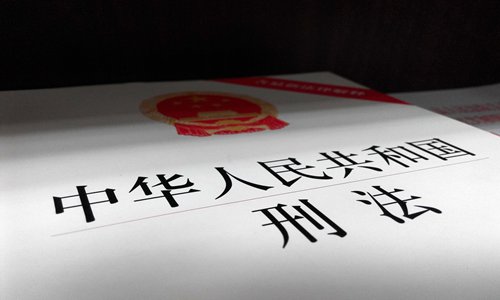
The cover of Chinese Crminal Law Photo: IC
More than 10,000 files and pieces of evidence were collected from 7,000 or so civil affair authorities, associations for human resources and retired military affairs, archive centers, companies and social organizations, the Xinhua News Agency reported on Monday.Regions like South China's Guangdong and Southwest China's Yunnan provinces launched special expert panels staffed by officials to deal with complicated cases, which effectively improved the speed and quality of amnesty work, Xinhua said.
"Different from the previous amnesties, which mainly applied to war criminals, the ninth amnesty targeted at ordinary prisoners whose crimes were less harmful to society with less malice from subjectivity," Zhi Zhenfeng, a legal expert at the Chinese Academy of Social Sciences in Beijing, told the Global Times.
Female prisoners, prisoners of a young age or senior age and who with physical disabilities were prioritized in consideration. Prisoners who once made a contribution to society were also on the list of amnesty, Zhi said.
Amnesty is a common practice worldwide, which is not a random or excessive release. The amnesty was in accordance with Chinese laws, he noted.
According to Zhi, the amnesty shows "the warmth of the country's legal system, reflecting humanitarian spirit."
He also noted as the amnesty was carried out amid the national celebration ahead of the 70th anniversary of the founding of the People's Republic of China on October 1, serving as a "conductive move to China's national identity and social solidarity and harmony."
For example, a woman who was imprisoned for illegal gambling in 2018 was released during the amnesty.
The woman, surnamed Liu, lost her husband who died while she was in prison, forcing her 14-year-old son to live with relatives, Xinhua said.
Judicial authorities in Changsha, Central China's Hunan Province, released Liu on September 2 in accordance with the amnesty.
According to Xinhua, Liu was pardoned as she met the standards of "a widow who has minor children and needs to be brought up by herself" and among those who were "sentenced to fixed-term imprisonment of not more than three years or to a term of not more than one year."
"I feel grateful," another pardoned prisoner was quoted as saying by Xinhua. "It is a special solicitude from the Party and the government," the man, surnamed Wang, was quoted as saying.
Wang was imprisoned in 2014 for embezzlement. He was pardoned for his contribution to the country, winning a second class prize of China's State Award for Science and Technology Progress.
The amnesty "sends warming messages to the convicts in the country" and "shows that prisoners will not be forgotten by our government, who really cares about prisoners' situation and human rights," Zhi said.
"It is also a signal for those who haven't got the chance of release, that if they behave well, amnesty may come one day."
China has announced total of nine amnesties since 1949. The previous one was in 2015 when 31,527 prisoners were pardoned, as a part of the commemorations for the 70th anniversary of the end of the World War II.

